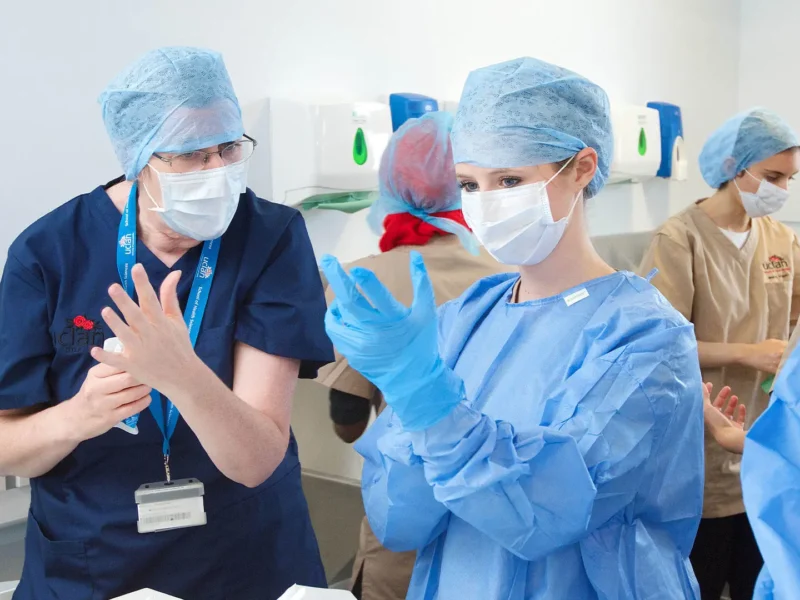No, you don’t necessarily need Triple Science to become a doctor, but it can be helpful. Triple Science involves studying Biology, Chemistry, and Physics extensively. While this background provides a strong foundation in essential scientific concepts, it’s not the only path to medical school. Students can still pursue a medical career by taking individual science courses or focused tracks.
However, those without a Triple Science background might face challenges catching up on core scientific concepts, adjusting to the intensity of medical school, and overcoming admissions barriers at certain institutions.
Ultimately, while Triple Science can be advantageous, it’s not a strict requirement for becoming a doctor. Passion, dedication, and hard work are equally important in pursuing a career in medicine.
What IS The Role of Science in Medical Education?

Science is the foundation of medical education, helping doctors learn about the body, diseases, and treatments. Subjects like biology, chemistry, and physics are important for medical students. They help students gain basic knowledge, think critically, and use science in real medical situations.
Foundation of Knowledge
At the heart of medical education lies a robust foundation built upon the principles of science. This base is crucial for students to grasp complex biological, chemical, and physical processes in health and illness. Subjects like anatomy, physiology, and pharmacology are closely linked to science, helping students understand how our bodies work and what goes wrong when we’re sick.
Development of Critical Thinking Skills
In medical education, critical thinking is really important. It helps doctors make good decisions. By reading scientific papers, doing experiments, and looking at data carefully, students learn to think critically. This helps them notice small details, see patterns, and make logical conclusions, which are all crucial for treating patients well.
In addition, learning to think critically doesn’t just make doctors better at their jobs. It also encourages them to keep learning throughout their careers. This means they’re always improving and staying up-to-date with the latest information and techniques in medicine.
Integration into Clinical Practice
The seamless integration of scientific knowledge into clinical practice is a hallmark of proficient medical professionals. Armed with a deep understanding of basic sciences, physicians navigate the complexities of patient care with confidence and precision.
Whether diagnosing illnesses, prescribing treatments, or interpreting diagnostic tests, the application of scientific principles forms the cornerstone of clinical decision-making.
Further, medical research keeps changing, and new technologies are always coming up. This means doctors need to keep improving how they treat patients. Having a strong understanding of science helps them stay updated and adjust their methods to give patients the best care possible.
Interdisciplinary Collaboration
Science serves as a unifying force, facilitating interdisciplinary collaboration within the field of medicine. The intersection of various disciplines, from molecular biology to pharmacokinetics, creates fertile ground for innovation and discovery.
Further, medical education emphasizes the value of teamwork and cross-disciplinary dialogue in addressing complex healthcare challenges. When doctors from different fields work together, they can use their knowledge to help patients better.
By teaming up, they can learn from each other and find new ways to treat people. This teamwork doesn’t just help patients now, it also makes healthcare better for everyone in the long run.
What Are The Admission Requirements for Medical School?
Navigating the path to medical school requires a comprehensive understanding of the admission requirements, which encompass a combination of academic, standardized testing, and non-academic criteria.
The journey begins with fulfilling the prerequisites set forth by medical institutions. It extends to demonstrating personal attributes and experiences that align with the mission of the medical profession.
Academic Prerequisites
Completion of a bachelor’s degree from an accredited institution is typically required, with specific coursework in sciences such as biology, chemistry, physics, and mathematics.
Maintaining a competitive Grade Point Average (GPA) is crucial as it serves as a benchmark for academic achievement. It demonstrates the candidate’s ability to excel in rigorous coursework.
Standardized Testing
The Medical College Admission Test (MCAT) is a standardized exam that assesses knowledge of biological and physical sciences, critical analysis, and reasoning skills. Performance on the MCAT is a significant factor in the admissions process for most medical schools.
Some medical schools may require additional entrance exams. For example, the UK Clinical Aptitude Test (UKCAT) or the Biomedical Admissions Test (BMAT), particularly in the United Kingdom. These exams assess specific skills and knowledge relevant to the medical field.
Non-Academic Requirements
Letters of recommendation from faculty, mentors, or healthcare professionals who can attest to the applicant’s character, academic abilities, and suitability for a career in medicine.
A compelling personal statement articulates the applicant’s motivation for pursuing a career in medicine. It highlights their unique experiences and perspectives, demonstrating their commitment to serving others.
Engaging in extracurriculars, volunteer work, research, and leadership demonstrates well-roundedness, compassion, and dedication to community service for applicants.
Variations in Admission Criteria
Admission requirements may vary among medical schools, with some institutions offering specialized programs or tracks tailored to specific interests or demographics.
Many medical schools embrace a holistic approach to admissions, considering factors such as socioeconomic background, diversity, and life experiences. This is in addition to academic performance and standardized test scores.
Additional Considerations
Certain medical programs may have postgraduate requirements or prerequisites for admission, such as completion of a master’s degree or specific clinical experiences.
International applicants should be aware of additional requirements for foreign students, including language proficiency exams and evaluations of academic credentials.
What Are Advantages of Triple Science for Aspiring Doctors?
Triple Science, covering Biology, Chemistry, and Physics extensively, is incredibly beneficial for those aiming for a medical career. It provides a strong base in crucial subjects relevant to medicine, helping students grasp essential concepts early on.
So, this background is vital for navigating the complexities of medical school and future practice as doctors.
Comprehensive Understanding of Basic Sciences
Triple Science exposes students to a broad spectrum of scientific principles encompassing biology, chemistry, and physics. This holistic approach enables aspiring doctors to develop a deep understanding of fundamental concepts that underpin various aspects of medical science.
Further, mastery of biology provides insights into the structure and function of living organisms, including human anatomy, physiology, and genetics. These are essential for understanding human health and disease.
Proficiency in chemistry facilitates comprehension of biochemical processes, pharmacology, and molecular interactions crucial for drug development, diagnostics, and therapeutics.
Also, physics knowledge aids in understanding physiological mechanisms, medical imaging, and instrumentation principles, improving proficiency in diagnosing and treating medical conditions.
Enhanced Critical Thinking and Problem-Solving Skills
Triple Science cultivates analytical thinking and problem-solving abilities essential for success in medical education and clinical practice. Students learn to approach complex scientific phenomena systematically, formulate hypotheses, and evaluate evidence to arrive at informed conclusions.
Exposure to diverse scientific disciplines fosters interdisciplinary thinking, enabling aspiring doctors to synthesize information from multiple sources and apply integrated approaches to medical challenges.
Preparation for Rigorous Medical Curriculum
The rigorous nature of Triple Science coursework provides a solid academic foundation that prepares students for the demanding curriculum of medical school.
Moreover, studying it helps students develop important traits like resilience, discipline, and curiosity. This prepares them well for the tough demands of medical school.
Triple Science graduates tend to handle the challenges of medical studies better because they’re already skilled at understanding complex scientific ideas and meeting high academic standards.
Competitive Advantage in Medical School Admissions
Medical school admissions committees often prioritize candidates with a robust science background, especially those with advanced coursework like Triple Science.
Further, academic excellence in science subjects can enhance an applicant’s competitiveness and demonstrate their commitment to pursuing a career in medicine.
Triple Science graduates may have a competitive edge in the admissions process. Their comprehensive scientific background attests to their readiness for the academic rigors of medical school. It also demonstrates their potential to excel in medical practice.
Alternatives to Triple Science for Aspiring Doctors

While triple science (biology, chemistry, physics) is the recommended path for aspiring doctors, there are alternatives to consider:
Combined Science with Strong Grades
Some universities might accept applications with combined science for medicine, especially if you achieve exceptional grades in all science subjects.
This option requires more focus on independent study or online resources to strengthen your understanding of biology and chemistry, crucial subjects for medical school.
A-Levels (or Equivalent) in Separate Sciences
If you’re still in high school, consider taking separate A-levels (or equivalent qualifications) in biology and chemistry after completing combined science. This demonstrates a strong commitment to science and allows you to delve deeper into these key medical school requirements.
Science Foundation Courses
If you’ve already completed high school with combined science, consider taking science foundation courses before applying to university.
Further, these intensive courses help bridge the gap and prepare you for university-level biology and chemistry.
Alternative Degree Paths
Explore undergraduate degrees in related fields like biomedical sciences, biochemistry, or human biology.
These degrees often incorporate necessary science courses and provide a strong foundation for medical school applications.
Important Considerations
Always check the specific requirements of medical schools you’re interested in. Some might have stricter guidelines or accept specific combinations of science qualifications.
Moreover, regardless of your science track, maintain excellent grades in all subjects, especially science and relevant electives like math. Medical schools look for well-rounded applicants.
Pursue extracurricular activities related to healthcare, volunteering, or research to showcase your commitment to the field.
Challenges for Those Without Triple Science Background
Challenges for students without a Triple Science background may include:
Catching up on Core Scientific Concepts
Students may find it challenging to grasp essential scientific principles in biology, chemistry, and physics if they haven’t studied these subjects extensively before entering medical school.
Adjusting to the Intensity of Medical Curriculum
Without a strong foundation in Triple Science, students may struggle to keep pace with the rigorous coursework and demanding schedule of medical school, which often builds upon advanced scientific concepts.
Overcoming Admissions Barriers
Some medical schools may prioritize applicants with a Triple Science background, making it more competitive for students without this experience to gain admission. These students may need to demonstrate their proficiency in scientific subjects through alternative means or additional preparation.
FAQ’s
What do you need triple science for?
Triple Science, comprising Biology, Chemistry, and Physics, is essential for various career paths such as medicine, biomedical sciences, physiotherapy, sports science, ecology, botany, pharmacy, pathology, and veterinary care.
What high school courses are needed to become a doctor in Canada?
To pursue a career in medicine in Canada, it’s recommended to have Grade 12 subjects including English Language Arts 30-1, Biology 30, Chemistry 30, Mathematics 30-1, and Physics 30. At least two years of full-time study are required, with specific prerequisites in these subjects.
Is Triple science hard?
No, While the content of triple science is not inherently more difficult than double science, triple science students may experience a greater workload due to covering more content in depth across both sciences.
Final Words
While Triple Science can help, you don’t have to have it to become a doctor. You can still succeed by focusing on individual science courses. Challenges may come up, like catching up on core concepts, but hard work and passion can overcome them. What really matters is your commitment to learning and doing your best.
So, while Triple Science is good, it’s not a must-have for becoming a doctor.



